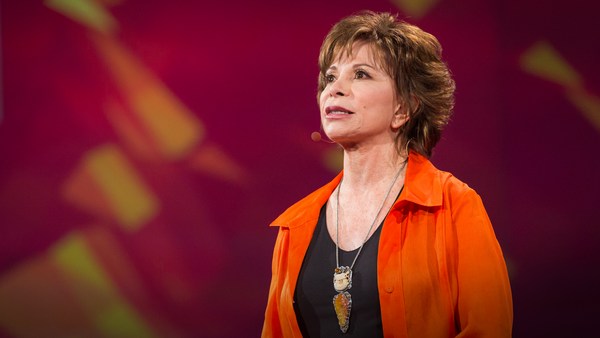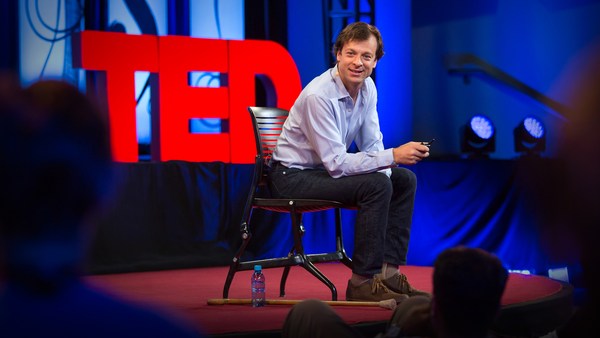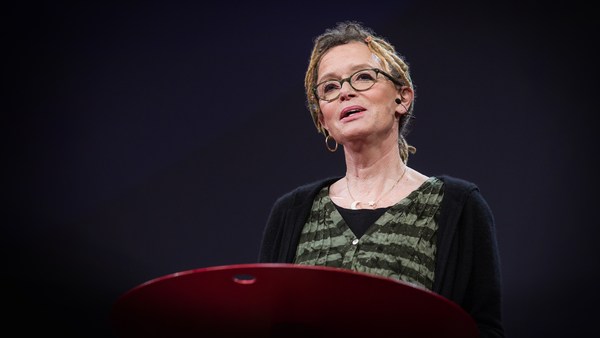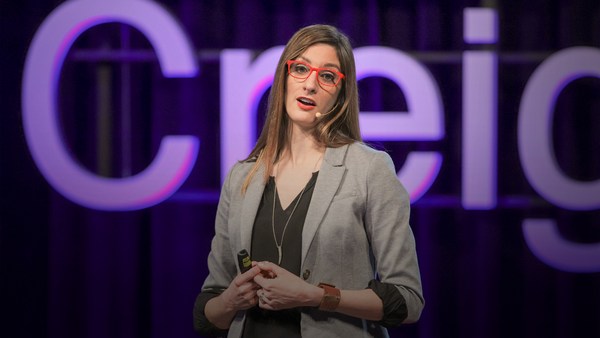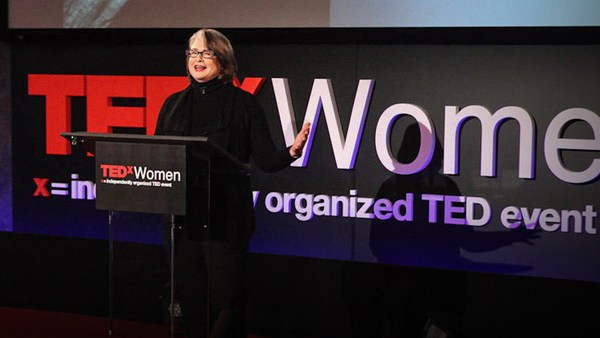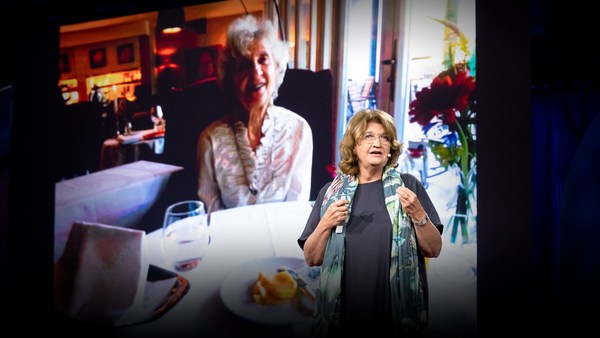What's one thing that every person in this room is going to become? Older. And most of us are scared stiff at the prospect. How does that word make you feel? I used to feel the same way. What was I most worried about? Ending up drooling in some grim institutional hallway. And then I learned that only four percent of older Americans are living in nursing homes, and the percentage is dropping. What else was I worried about? Dementia. Turns out that most of us can think just fine to the end. Dementia rates are dropping, too. The real epidemic is anxiety over memory loss.
(Laughter)
I also figured that old people were depressed because they were old and they were going to die soon.
(Laughter)
It turns out that the longer people live, the less they fear dying, and that people are happiest at the beginnings and the end of their lives. It's called the U-curve of happiness, and it's been borne out by dozens of studies around the world. You don't have to be a Buddhist or a billionaire. The curve is a function of the way aging itself affects the brain.
So I started feeling a lot better about getting older, and I started obsessing about why so few people know these things. The reason is ageism: discrimination and stereotyping on the basis of age. We experience it anytime someone assumes we're too old for something, instead of finding out who we are and what we're capable of, or too young. Ageism cuts both ways. All -isms are socially constructed ideas -- racism, sexism, homophobia -- and that means we make them up, and they can change over time. All these prejudices pit us against each other to maintain the status quo, like auto workers in the US competing against auto workers in Mexico instead of organizing for better wages.
(Applause)
We know it's not OK to allocate resources by race or by sex. Why should it be OK to weigh the needs of the young against the old? All prejudice relies on "othering" -- seeing a group of people as other than ourselves: other race, other religion, other nationality. The strange thing about ageism: that other is us. Ageism feeds on denial -- our reluctance to acknowledge that we are going to become that older person. It's denial when we try to pass for younger or when we believe in anti-aging products, or when we feel like our bodies are betraying us, simply because they are changing. Why on earth do we stop celebrating the ability to adapt and grow as we move through life? Why should aging well mean struggling to look and move like younger versions of ourselves? It's embarrassing to be called out as older until we quit being embarrassed about it, and it's not healthy to go through life dreading our futures. The sooner we get off this hamster wheel of age denial, the better off we are.
Stereotypes are always a mistake, of course, but especially when it comes to age, because the longer we live, the more different from one another we become. Right? Think about it. And yet, we tend to think of everyone in a retirement home as the same age: old --
(Laughter)
when they can span four decades. Can you imagine thinking that way about a group of people between the ages of 20 and 60?
When you get to a party, do you head for people your own age? Have you ever grumbled about entitled millennials? Have you ever rejected a haircut or a relationship or an outing because it's not age-appropriate? For adults, there's no such thing. All these behaviors are ageist. We all do them, and we can't challenge bias unless we're aware of it. Nobody's born ageist, but it starts at early childhood, around the same time attitudes towards race and gender start to form, because negative messages about late life bombard us from the media and popular culture at every turn. Right? Wrinkles are ugly. Old people are pathetic. It's sad to be old.
Look at Hollywood. A survey of recent Best Picture nominations found that only 12 percent of speaking or named characters were age 60 and up, and many of them were portrayed as impaired. Older people can be the most ageist of all, because we've had a lifetime to internalize these messages and we've never thought to challenge them. I had to acknowledge it and stop colluding. "Senior moment" quips, for example: I stopped making them when it dawned on me that when I lost the car keys in high school, I didn't call it a "junior moment."
(Laughter)
I stopped blaming my sore knee on being 64. My other knee doesn't hurt, and it's just as old.
(Laughter)
(Applause)
We are all worried about some aspect of getting older, whether running out of money, getting sick, ending up alone, and those fears are legitimate and real. But what never dawns on most of us is that the experience of reaching old age can be better or worse depending on the culture in which it takes place. It is not having a vagina that makes life harder for women. It's sexism.
(Applause)
It's not loving a man that makes life harder for gay guys. It's homophobia. And it is not the passage of time that makes getting older so much harder than it has to be. It is ageism. When labels are hard to read or there's no handrail or we can't open the damn jar, we blame ourselves, our failure to age successfully, instead of the ageism that makes those natural transitions shameful and the discrimination that makes those barriers acceptable. You can't make money off satisfaction, but shame and fear create markets, and capitalism always needs new markets. Who says wrinkles are ugly? The multi-billion-dollar skin care industry. Who says perimenopause and low T and mild cognitive impairment are medical conditions? The trillion-dollar pharmaceutical industry.
(Cheers)
The more clearly we see these forces at work, the easier it is to come up with alternative, more positive and more accurate narratives. Aging is not a problem to be fixed or a disease to be cured. It is a natural, powerful, lifelong process that unites us all.
Changing the culture is a tall order, I know that, but culture is fluid. Look at how much the position of women has changed in my lifetime or the incredible strides that the gay rights movement has made in just a few decades, right?
(Applause)
Look at gender. We used to think of it as a binary, male or female, and now we understand it's a spectrum. It is high time to ditch the old-young binary, too. There is no line in the sand between old and young, after which it's all downhill. And the longer we wait to challenge that idea, the more damage it does to ourselves and our place in the world, like in the workforce, where age discrimination is rampant. In Silicon Valley, engineers are getting Botoxed and hair-plugged before key interviews -- and these are skilled white men in their 30s, so imagine the effects further down the food chain.
(Laughter)
The personal and economic consequences are devastating. Not one stereotype about older workers holds up under scrutiny. Companies aren't adaptable and creative because their employees are young; they're adaptable and creative despite it. Companies --
(Laughter)
(Applause)
We know that diverse companies aren't just better places to work; they work better. And just like race and sex, age is a criterion for diversity.
A growing body of fascinating research shows that attitudes towards aging affect how our minds and bodies function at the cellular level. When we talk to older people like this (Speaks more loudly) or call them "sweetie" or "young lady" -- it's called elderspeak -- they appear to instantly age, walking and talking less competently. People with more positive feelings towards aging walk faster, they do better on memory tests, they heal quicker, and they live longer. Even with brains full of plaques and tangles, some people stayed sharp to the end. What did they have in common? A sense of purpose. And what's the biggest obstacle to having a sense of purpose in late life? A culture that tells us that getting older means shuffling offstage. That's why the World Health Organization is developing a global anti-ageism initiative to extend not just life span but health span.
Women experience the double whammy of ageism and sexism, so we experience aging differently. There's a double standard at work here -- shocker --
(Laughter)
the notion that aging enhances men and devalues women. Women reinforce this double standard when we compete to stay young, another punishing and losing proposition. Does any woman in this room really believe that she is a lesser version -- less interesting, less fun in bed, less valuable -- than the woman she once was? This discrimination affects our health, our well-being and our income, and the effects add up over time. They are further compounded by race and by class, which is why, everywhere in the world, the poorest of the poor are old women of color.
What's the takeaway from that map? By 2050, one out of five of us, almost two billion people, will be age 60 and up. Longevity is a fundamental hallmark of human progress. All these older people represent a vast unprecedented and untapped market. And yet, capitalism and urbanization have propelled age bias into every corner of the globe, from Switzerland, where elders fare the best, to Afghanistan, which sits at the bottom of the Global AgeWatch Index. Half of the world's countries aren't mentioned on that list because we don't bother to collect data on millions of people because they're no longer young. Almost two-thirds of people over 60 around the world say they have trouble accessing healthcare. Almost three-quarters say their income doesn't cover basic services like food, water, electricity, and decent housing. Is this the world we want our children, who may well live to be a hundred, to inherit? Everyone -- all ages, all genders, all nationalities -- is old or future-old, and unless we put an end to it, ageism will oppress us all. And that makes it a perfect target for collective advocacy.
Why add another -ism to the list when so many, racism in particular, call out for action? Here's the thing: we don't have to choose. When we make the world a better place to grow old in, we make it a better place in which to be from somewhere else, to have a disability, to be queer, to be non-rich, to be non-white. And when we show up at all ages for whatever cause matters most to us -- save the whales, save the democracy -- we not only make that effort more effective, we dismantle ageism in the process.
Longevity is here to stay. A movement to end ageism is underway. I'm in it, and I hope you will join me.
(Applause and cheers)
Thank you. Let's do it! Let's do it!
(Applause)
